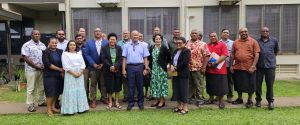

The Fiji National University’s (FNU) College of Agriculture, Fisheries and Forestry (CAFF) has taken a significant step towards ensuring its graduates are industry-ready by hosting advisory board meetings with relevant line ministries and stakeholders of the wider agricultural, forestry and fisheries sectors.
The initiative, spearheaded by CAFF Dean, Dr Kaliova Ravuiwasa, marks a renewed focus on aligning the College’s curriculum with the evolving demands of these sectors.
“It is crucial for us to collaborate closely with industry stakeholders to understand their needs and expectations,” Dr Ravuiwasa said.
“These meetings provide a platform for open dialogue and ensure that our programmes remain relevant and produce graduates who are well-prepared for the workforce.”
Permanent Secretary for the Ministry of Agriculture and Waterways, Dr Andrew Tukana, emphasised the importance of this collaboration.
“This is a positive step forward. By working together, FNU and industry stakeholders can ensure that graduates possess the necessary skills and knowledge to contribute effectively to the growth of the agricultural sector,” said Dr Tukana.
Industry representatives from Fiji’s agriculture, animal science, fisheries, and forestry sectors, including those from the Fiji Ministry of Agriculture and Waterways, Ministry of Forestry and Fisheries, Biosecurity Authority of Fiji, and the private sectors, participated in these advisory meetings held over the course of two days.
The representatives shared valuable insights into the skills and knowledge required by today’s agricultural, fisheries and forestry professionals. CAFF plans to incorporate the feedback received from stakeholders into its curriculum to create more tailored and industry-relevant programmes.
Joel Evangelista, the Head of Livestock at Rooster Poultry, highlighted the significance of the discussions.
“These meetings provide an opportunity to address the challenges faced by graduates and stakeholders alike. We believe that CAFF is producing capable graduates, and this initiative will further strengthen their preparedness for the industry.”
By prioritising industry engagement, FNU CAFF aims to produce graduates who are not only academically qualified but also equipped with the practical skills demanded by the agricultural sector. This initiative is expected to contribute to the overall development of Fiji’s agriculture, animal science, fisheries, and forestry industries.